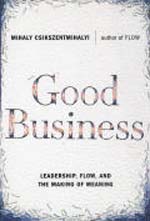 Work can, it should, make you happy. If it doesn’t something is wrong, according to the psychologist Mihaly Csikszentmihalyi in his stimulating Good Business: Leadership, Flow and the Making of Meaning. We spend much of our lives working, and it is not just a waste of time and energy when we do not enjoy it. Our output suffers, which ultimately is bad for society, not just for ourselves.
Work can, it should, make you happy. If it doesn’t something is wrong, according to the psychologist Mihaly Csikszentmihalyi in his stimulating Good Business: Leadership, Flow and the Making of Meaning. We spend much of our lives working, and it is not just a waste of time and energy when we do not enjoy it. Our output suffers, which ultimately is bad for society, not just for ourselves.
Hungarian-born Csikszentmihalyi (pronounced chick-sent-me-high) wrote the groundbreaking Flow: The Psychology of Optimal Experience, a 1990 book that brought his research into human behavior to a wider audience. In 1999, after a long career teaching psychology at the University of Chicago, he began teaching the subject to M.B.A. students at the Peter F. Drucker Graduate School of Management of Claremont (California) Graduate University. He also directs The Quality of Life Research Center. He now takes flow, and the psychological basis for happiness and fulfillment, into business.
Flow, in Csikszentmihal-yi’s system, means being so absorbed in an activity that we shut out distractions and worries to devote all our energy to the task at hand. It can occur in work or play, but the focus here is how people can find flow when they work, and how leaders can encourage flow in employees.
Flow occurs when there is a balance between high challenges and skills. So it is unlikely in an activity until we become proficient in it. It’s also not static. Without continual challenge, boredom creeps in. “The important factor to keep in mind is that personal growth is contingent on the balance of opportunities for action and the capacities to act that a person encounters at work,” he writes.
Csikszentmihalyi describes seven other components of flow: clear goals, immediate feedback, deepening concentration, focus on the moment, personal control, a sense of altered time, and loss of ego. However, flow by itself is not sufficient for a happy, productive, and meaningful life. We must be engaged in a worthy, ethical enterprise, working toward aspirations beyond ourselves and, ideally, with effects beyond our lifetime.
Finding flow is important, but happiness is the bottom line. Csikszentmihalyi says happiness usually follows fulfilling our potential, which rests on two separate but simultaneous processes.
One is differentiation, the recognition of our unique characteristics and our sense of responsibility for survival and well-being. The other is integration: realizing that we are “completely enmeshed in networks of relationships with other human beings, with cultural symbols and artifacts, and with the surrounding natural environment. A person who is fully differentiated and integrated becomes a complex individual—one who has the best chance at leading a happy, vital, and meaningful life.”
Bruce Rosenstein writes for USA Today. This review appeared originally in the "Money" section of USA Today, and is reprinted here by permission.